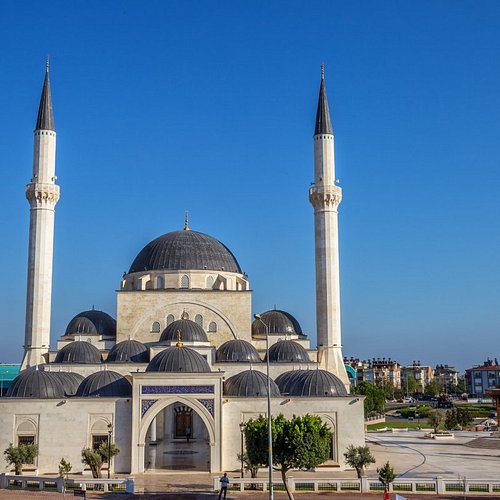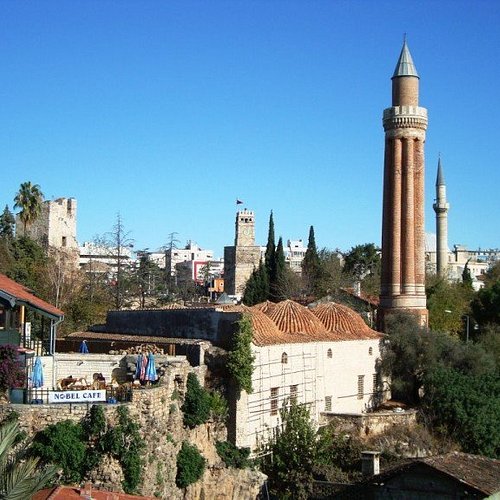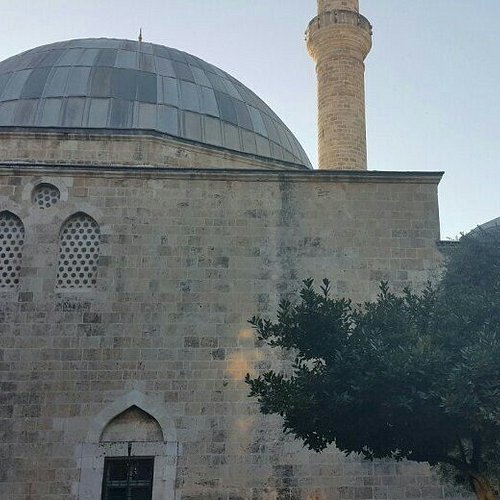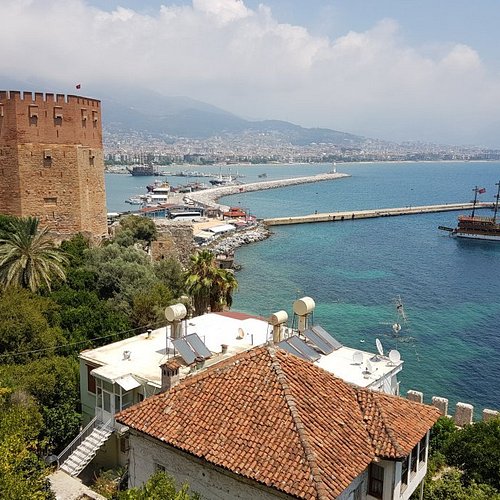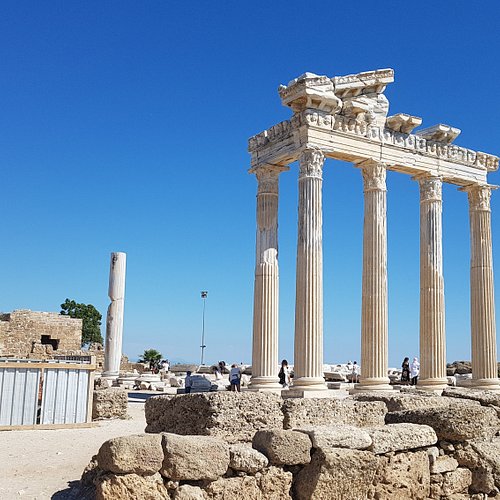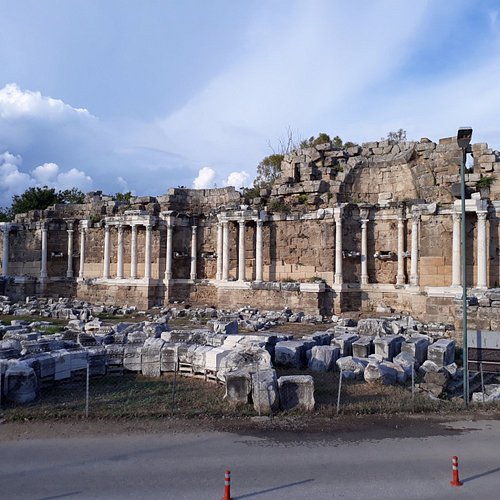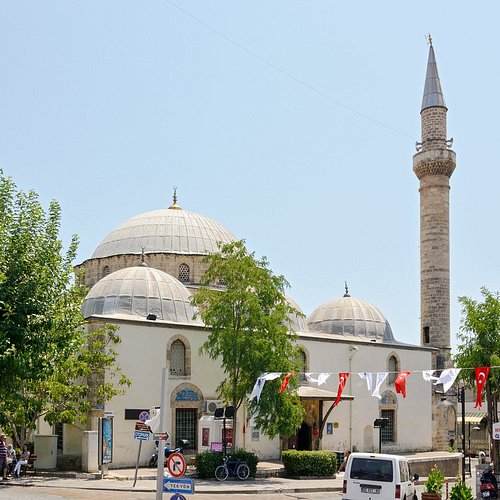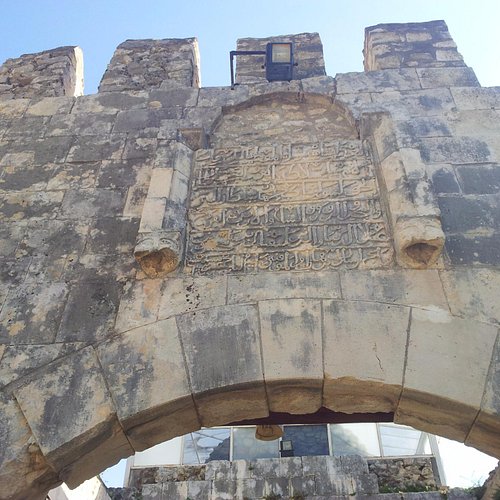10 Architectural Buildings in Antalya Province That You Shouldn't Miss
Antalya Province (Turkish: Antalya ili) is located on the Mediterranean coast of south-west Turkey, between the Taurus Mountains and the Mediterranean sea.
Restaurants in Antalya Province
1. Celebi Sultan Mehmet Camii
2. Yivli Minaret Mosque
Overall Ratings
4.5 based on 270 reviews
This mosque was built in the 13th century by the Seljuk sultan Alaeddin Keykubat. The elegant, fluted minaret has become a symbol of Anatalya.
Reviewed By carolas936 - Marietta, United States
Yivli Minaret Mosque (a.k.a Alaaddin Mosque , Yivli Minare Mosque (literally: "Fluted Minaret" Mosque), or Ulu Cami, "Grand Mosque") is located in Kaleiçi (old town) on Cumhuriyet Cd. It is part of a külliye (mosque complex) which includes the Gıyaseddin Keyhüsrev Medrese (school), Seljuk and Dervish lodge, and the tombs of Zincirkıran and Nigar Hatun. The mosque's fluted minaret is a landmark and symbol of the city (it is listed as a World Heritage Site). The original mosque and minaret was built in 1230 on the orders of Sultan Alaeddin Keykubad I (the Seljuk Sultan of Rûm who ruled from 1220-1237), incorporating the walls of a ruined Byzantine church (earthworks from this period can be seen under a glassed section of floor within the mosque). The original mosque (but not the minaret) was destroyed in the 14th century; an inscription at the entrance indicates the current mosque was built in 1373 by Mehmet Bey, grandson of Yunus Bey from the Hamitoglu clan. The prayer hall was rebuilt with its six domes and is one of the oldest examples of multi-domed mosques in Anatolia. The building is rectangular with plain decoration, with a roof supported by 12 columns with ancient column heads. Beside it, the 38m fluted minaret is a unique example of Anatolian Turkish architecture, standing on a large square stone base. The minaret has eight flutes on its brick shaft, and was originally decorated with dark blue and turquoise-colored tiles on every other row of the minaret trunk, giving an illusion of stripes running up the flanks. The minaret was restored in 1953, 1961 and 1973. The minaret is beautifully lit at night, highlighting its top and conical roof. In the mosque garden are two mausoleums, one of Sufi sheikh Zincirkıran Mehmet Bey (1377) and the other of Nigar Hatun (who died in 1503, the consort of Ottoman Sultan Bayezid II). The mosque is open every day, but may be closed during times of prayer. There is no entrance fee, although a donation is gratefully accepted.
3. Murat Pasa Mosque
4. Red Tower
Overall Ratings
4.5 based on 948 reviews
Reviewed By Jane2003rugby - Kingston-upon-Hull, United Kingdom
The Red Tower is located at the end of the harbour, just up from the jetty. The opening hours where 9.00 am - 19.00 pm in the summer. Entrance fee was 7 TL or 10 TL with the Shipyard or 14 TL with Shipyard & Damlatas cave. Four floors to visit, plus the turret with fantastic views at the top. As this is a medieval tower, there are lots of steep ,narrow, steps to climb, so not suitable for people with disabilities, or small children. Displays, models, old photos, on each floor. A must do, is on the second floor, walk out onto the old walls, the only way you can access it, again great views, but a lot of people miss it.
5. Temple of Apollo
Overall Ratings
4.5 based on 4,998 reviews
Reviewed By GaryMWar - Southport, United Kingdom
Nice walk round Side Town leads you to this, The Temple of Apollo, this is open and free to take a look around and is great to see, local bars nearby and shops, well worth a visit
6. Monumental Fountain (Nymphaeum)
Overall Ratings
4.5 based on 505 reviews
Reviewed By KatharineReviews - Newbury, United Kingdom
This is one of the nearest ancient city parts to the parking and public transport area but, along with the Apollo temple and the amphitheatre, one of the most stunning. Great to think how it may have worked when fully functioning but some noticeboards also give guidance. A must-see for any visitor to Side.
7. Tekeli Mehmet Pasa Mosque
8. Iskele Mosque
Overall Ratings
4.0 based on 23 reviews
This attractive, 19th century mosque is located beside the marina. It was constructed of cut stone and built on four pillars.
Reviewed By carolas936 - Marietta, United States
Iskele Mosque is below the city walls, adjacent to the Kaleiçi yacht harbor. The hexagonal mosque is built on four stone pillars, with a short minaret with a conical roof on one side. There is a well enclosing a spring of fresh water in the lower floor. The entrance is from a staircase on north-east side. The construction date is unknown, but its Seljuk architectural style may indicate it was built in the 12th or 13th century. The building might have been a Byzantine church before it was converted into a mosque after conquest by the Seljuk Turks in the early 13th century. Inside is a carpet-covered floor, a mihrab (wall niche pointing towards Mecca), and a small wood pulpit. The inscription by the southwestern window may indicate that the mosque was repaired during the restoration work on the castle walls. The mosque is open during the day with no entry fee.

